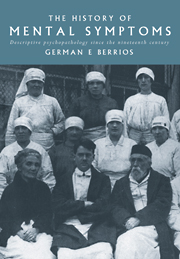Book contents
- Frontmatter
- Contents
- PREFACE
- ACKNOWLEDGEMENTS
- INTRODUCTION
- PART I The object of inquiry
- PART II Cognition and consciousness
- CHAPTER 3 Disorders of perception
- CHAPTER 4 Thought disorder
- CHAPTER 5 Delusions
- CHAPTER 6 Obsessions and compulsions
- CHAPTER 7 Mental Retardation
- CHAPTER 8 Cognitive impairment
- CHAPTER 9 Memory and its disorders
- CHAPTER 10 Consciousness and its disorders
- PART III Mood and emotions
- PART IV Volition and action
- PART V Miscellany
- REFERENCES
- NAME INDEX
- SUBJECT INDEX
CHAPTER 8 - Cognitive impairment
from PART II - Cognition and consciousness
Published online by Cambridge University Press: 08 January 2010
- Frontmatter
- Contents
- PREFACE
- ACKNOWLEDGEMENTS
- INTRODUCTION
- PART I The object of inquiry
- PART II Cognition and consciousness
- CHAPTER 3 Disorders of perception
- CHAPTER 4 Thought disorder
- CHAPTER 5 Delusions
- CHAPTER 6 Obsessions and compulsions
- CHAPTER 7 Mental Retardation
- CHAPTER 8 Cognitive impairment
- CHAPTER 9 Memory and its disorders
- CHAPTER 10 Consciousness and its disorders
- PART III Mood and emotions
- PART IV Volition and action
- PART V Miscellany
- REFERENCES
- NAME INDEX
- SUBJECT INDEX
Summary
As mentioned in Chapter 7, idiocy and dementia - the two syndromic forms of intellectual failure - were differentiated before Esquirol, although this alienist made their separation official. The history of acquired cognitive impairment, called here dementia for short, will also throw light on the history of the concept of cognition.
The current concept of dementia was constructed during the nineteenth and early twentieth centuries. This process can be described as one of pruning down the heterogeneous clinical content of dementia. The process started before 1800 and culminated in the early 1900s in what I have called the ‘cognitive paradigm’, i.e. the view that dementia just consisted of an irreversible disorder of intellectual functions. Historical analysis shows that this view resulted more from ideology than clinical observation. For decades, the cognitive paradigm has prevented the adequate mapping of the non-cognitive symptoms of dementia and hindered research.
Dementia before the eighteenth century
Before 1700, terms such as amentia, imbecility, morosis, fatuitas, anoea, foolishness, stupidity, simplicity, cams, idiocy, dotage, and senility (but surprisingly not dementia) were used to name, in varying degree, states of cognitive and behavioural deterioration leading to psychosocial incompetence. The word dementia, which is almost as old as the oldest of those listed above (for example, it is already found in Lucretius) simply meant ‘being out of one's mind.’
- Type
- Chapter
- Information
- The History of Mental SymptomsDescriptive Psychopathology since the Nineteenth Century, pp. 172 - 207Publisher: Cambridge University PressPrint publication year: 1996
- 2
- Cited by



